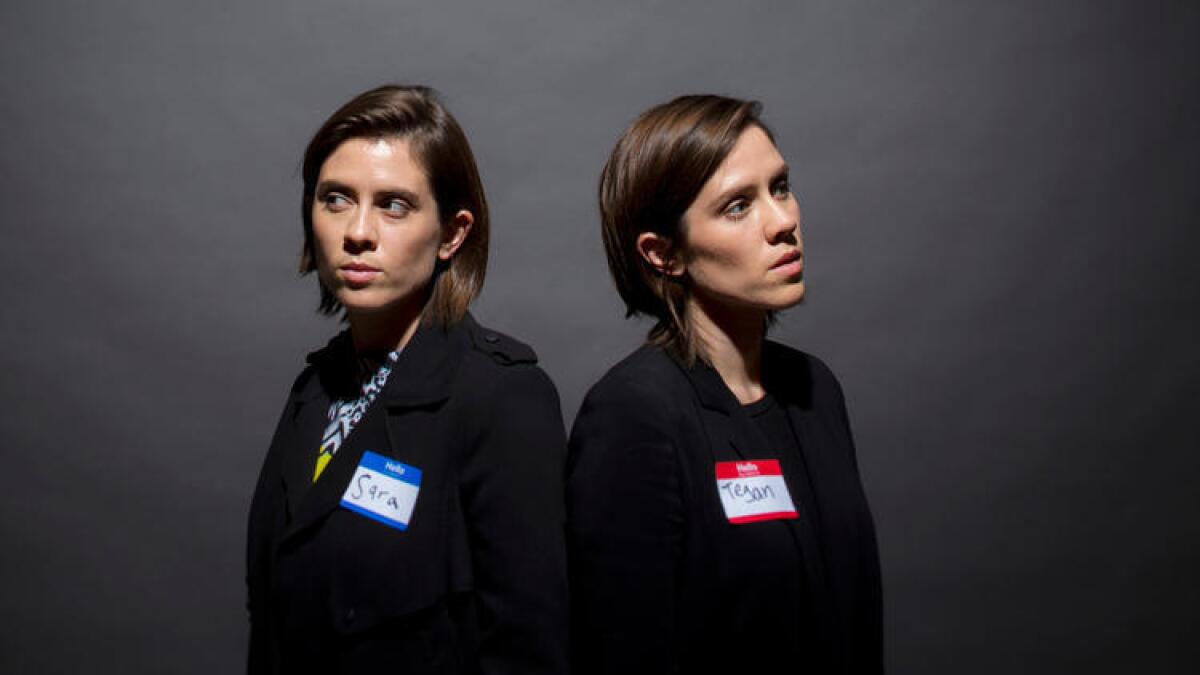‘My dream come true’: How LGBTQ history was made with the ‘Happiest Season’ soundtrack
- Share via
The 2020 holiday season has arrived, but don’t go dashing just yet: Thanks to the ongoing COVID-19 pandemic, travel is more perilous than ever before, and millions of Americans will be missing their families for the first time ever this Christmas.
But for many LGBTQ people, steering clear of family for the holidays is a longtime tradition, and not always by choice.
Released on Thursday, the new Hulu original film “Happiest Season” sheds light on an all-too-common dilemma for gay couples during the holidays: both coming home and coming out to their respective families. Actresses Kristen Stewart and Mackenzie Davis play girlfriends Abby and Harper, whose deepening bond is tested when they visit Harper’s family for Christmas — and, for fear of a fallout with her conservative parents, Harper introduces Abby as her roommate.
How Clea DuVall’s lesbian Christmas rom-com ‘Happiest Season,’ starring Kristen Stewart and Mackenzie Davis, came to be, and why coming-out stories are still important.
The film was directed by Clea DuVall, who first cut her teeth as an actress in ’90s films like “The Faculty,” “Girl, Interrupted” and the queer cult classic “But I’m a Cheerleader.” DuVall co-wrote “Happiest Season” with comedian Mary Holland, and tapped the Grammy-nominated songwriter and GLAAD board member Justin Tranter to executive produce and co-write the original soundtrack. “I said, ‘A queer holiday movie?’” Tranter tells The Times. “This is literally my dream come true!”
Written and performed by an entirely LGBTQ cast, the track list features new Christmas tunes by queer pop luminaries such as Sia, Shea Diamond and sister act Tegan and Sara. “Christmas music taps into this nostalgic, heartfelt place where I want to believe that something good can come of us, the humans that are ruining the Earth,” says Tegan Quin, whose glossy synth-pop song “Make You Mine This Season” became the prototype for the rest of the soundtrack. “Maybe we don’t deserve an asteroid, we deserve love!”
“A lot of us don’t feel comfortable going home during Christmas,” says Diamond, a singer-songwriter and Black transgender activist, who wrote and performed “Mrs. Claus” and “Blame It on Christmas” with Bebe Rexha. “We know the lives that we lead would not be supported [by] the family. We’ve always kind of snuck our relationships into our family’s lives, like, ‘This is my friend!’ With ‘Happiest Season,’ you see that tension represented in a major studio film for the first time.”
Over Zoom, Tranter, Diamond and Tegan Quin discussed the cultural impact of a movie like “Happiest Season” and the many reasons Christmas belongs to queer people, too.

Christmas is a time for family, but so much of our cultural programming posits LGBTQ people against the ideal of the family. Many people go years without seeing their birth families at all. Why is it so important for the LGBTQ community to claim Christmas for ourselves?
Diamond: Christmas is about coming together. And that’s something that many of us in the LGBT community have not been afforded. To reclaim Christmas is very powerful. [Why should] we be discarded during the holidays? To that I stand up and say, I’m Black and I’m trans, g—! And I love Christmas.
Tranter: I grew up super lucky. When I came out, my parents barely flinched. My family was never traditional, so I was able to have high school boyfriends and bring them home for holidays. In this movie, though, it’s a very traditional Christmas that they’re trying to navigate their way through. There’s a song on the album called “Chosen Family” that’s about how your family can be a traditional family, or a chosen family [based on] romantic love, friendship love.
Quin: I’ve known Clea for 12 years, and we’ve spent a bunch of Christmases together. She and I were talking about how crazy it was that there wasn’t a Christmas movie for gay people — for gay women specifically, as there are plenty of gay men in movies. I was like, “I want like a ‘National Lampoon’s Christmas,’ but lesbian.” What I love most about the movie is that it reflects a story that’s still really common. Especially in North America, there’s the struggle to come out, to accept who you are, to feel comfortable in heteronormative or religious spaces, to fit in with your family. It’s not my story — I was very much embraced — but it still resonated because coming out is always kind of awkward.
Did you consult with Clea DuVall on the soundtrack? What did she have in mind for the music?
Quin: When the movie was done, Clea called Sara and I and said: “I want you guys to write a song for the movie. I want it to sound like that big Mariah Carey Christmas song.” And I’m like, “Do you mean the biggest Christmas song of all time?” And she’s like, “Yeah, something like that!” And I’m like, “You clearly don’t understand my abilities or how music works, but sure.”
Tranter: I got first a call from Warner saying, “Hey, there’s this movie and there’s already a Tegan and Sara song attached.” I said, “A queer holiday movie? This is literally my dream come true!” The movie is a classic holiday love story, it just happens to have this modern setting of two women in love. So I wanted to give it a classic holiday soundtrack feel.
Quin: Sara wrote a really depressing Christmas song about breakups — Sara always wants to write about divorce and sadness — and I went in and put bells and Christmassy sounds over it. Then we pulled it back to Mariah Carey territory!
Tranter: In the pandemic, I turned my house into a recording studio. The amount of sleigh bells brought to my home was truly shocking. There’s this young queer woman named Kennedi who’s an amazing songwriter and artist who’s written for Ariana [Grande]. And I was like, “I want to write these songs with a younger woman, because this movie is about younger women.” Also, if we’re trying to make a classic Christmas album, the most classic-sounding soul singer I know happens to also be a Black trans woman, and that was Shea Diamond. Clea was like, “Get Shea to your house!”

Shea Diamond - Mrs. Claus (From “Happiest Season”)
Shea’s song, “Mrs. Claus,” rallies around the fact that so much of the magic behind Christmas is actually women’s labor. (“Without Mrs. Claus there’d be no Christmas at all!”)
Diamond: It is 2020 and women are still being erased. And before we even speak about Black trans women, let’s speak about women in general. Women are being erased. They are second class or third class. I think of people like Kamala [Harris] and what it means to us to see the first woman vice president in 2020. We still have so many obstacles and so many barriers to cross. And so why not just get straight to the point? Fa-la-la-la-la, what about Mrs. Claus? Who’s bringing Santa the milk and cookies? Who makes sure he’s OK when he gets sick? Her story has never been told.
Quin: You just exploded my brain. Santa Claus gets all the praise!

In “Happiest Season,” a really important lesson for the community is that everyone has a different relationship to their sexuality — while some people are forced out of the closet, others may never come out at all. What’s some advice you have for LGBTQ folks trying to navigate the holiday season?
Quin: For people who have a hard time around Christmas, I really think building your chosen family, building your own new traditions and shaking off the past, that’s a key to finding your Christmas joy.
Diamond: I have an amazing chosen family in the LGBT community. As of late I’ve spent [holidays] with Justin. We’ll get a phone call from Sam Smith or somebody else like, “Hey, what are you doing for the holidays?” And as I’ve reconnected more with my birth family, I still got my chosen family to guide me all the way because when you try to reconnect with family, some triggering things can happen. Emotions are flying everywhere. But it’s been 10, 20 years, and life is too short.
The Recording Academy responded: ‘We understand that the Weeknd is disappointed ... Unfortunately ... there are fewer nominations than ... deserving artists.’
What is a formative Christmas memory you have?
Diamond: It’s a long story, but I had just been reunited with my birth mother for the first time. She had been working her ass off, trying to figure out how to buy toys for all her kids, but she bought me a TV that I wanted. I heard her silently crying at nighttime because she was really stressing over the other kids. Me being the oldest child, I told her to take the TV back. So we took that TV back and got the kids something. I realize what really encompassed Christmas was the gift giving and not so much receiving.
Quin: As adults, Christmas became the only time Sara and I spent quality time together outside of our band. As our job got bigger and our schedule got busier, Christmas became this extremely special, coveted period of time and we wanted to protect that. Our parents got divorced and remarried, and we were done being passed around. So one year we invited the whole family to Palm Springs, and it’s been like that for years. We have new traditions: We don’t do gifts, we don’t have Christmas dinner, nobody’s emptying the dishwasher. Now we just sit by the pool, go to Target, buy Christmas hats we don’t need and enjoy our time together.
More to Read
The biggest entertainment stories
Get our big stories about Hollywood, film, television, music, arts, culture and more right in your inbox as soon as they publish.
You may occasionally receive promotional content from the Los Angeles Times.










